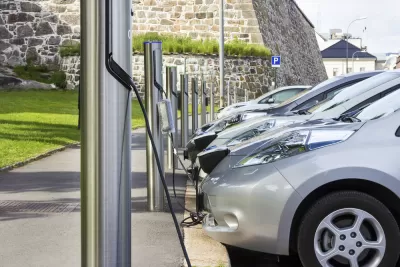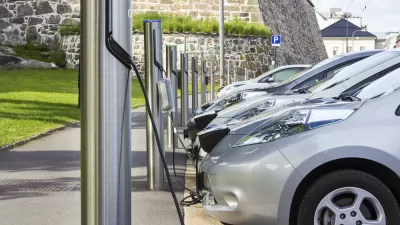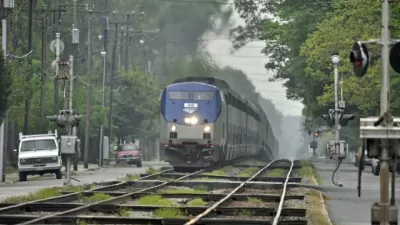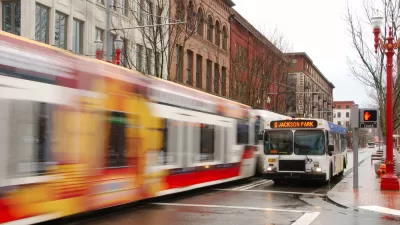Funding the electrification of personal vehicles won't move the needle on climate change nearly as much as investing in infrastructure that lets people get out of their cars, mode shift advocates argue.

The Bipartisan Infrastructure Bill includes $15 billion in funding for electrification of vehicles, down from the "whopping $100 billion in consumer incentives (and $15 billion more for EV fueling infrastructure)" proposed in President Biden's American Jobs Plan. But as Kea Wilson writes, transit and biking advocates say the bill remains too fixated on EVs as a solution for climate change. "Biden’s over-focus on electric vehicles as a silver-bullet climate solution will come at a steep cost to the modes that scientists agree hold the real key to saving the planet without accelerating the national traffic violence crisis: transit, biking and walking."
Electrifying personal vehicles, says John Stout of the U.S. Public Interest Research Group, is "only part of the solution to our transportation woes. In addition to garnering the federal government’s support for a faster transition to EVs … we need to make it easier for people to drive less." Beth Osborne, director of Transportation for America, said in a statement, "[i]n its current state, this deal fails to accomplish the administration’s goal of reducing emissions, preserving both the status quo of easy money to build new highways (while neglecting basic repair needs) and the existing, complex hurdles to build transit."
FULL STORY: Biden’s Climate Vision is Too Focused on EVs — Again

Alabama: Trump Terminates Settlements for Black Communities Harmed By Raw Sewage
Trump deemed the landmark civil rights agreement “illegal DEI and environmental justice policy.”

Planetizen Federal Action Tracker
A weekly monitor of how Trump’s orders and actions are impacting planners and planning in America.

How Atlanta Built 7,000 Housing Units in 3 Years
The city’s comprehensive, neighborhood-focused housing strategy focuses on identifying properties and land that can be repurposed for housing and encouraging development in underserved neighborhoods.

In Both Crashes and Crime, Public Transportation is Far Safer than Driving
Contrary to popular assumptions, public transportation has far lower crash and crime rates than automobile travel. For safer communities, improve and encourage transit travel.

Report: Zoning Reforms Should Complement Nashville’s Ambitious Transit Plan
Without reform, restrictive zoning codes will limit the impact of the city’s planned transit expansion and could exclude some of the residents who depend on transit the most.

Judge Orders Release of Frozen IRA, IIJA Funding
The decision is a victory for environmental groups who charged that freezing funds for critical infrastructure and disaster response programs caused “real and irreparable harm” to communities.
Urban Design for Planners 1: Software Tools
This six-course series explores essential urban design concepts using open source software and equips planners with the tools they need to participate fully in the urban design process.
Planning for Universal Design
Learn the tools for implementing Universal Design in planning regulations.
Caltrans
Smith Gee Studio
Institute for Housing and Urban Development Studies (IHS)
City of Grandview
Harvard GSD Executive Education
Toledo-Lucas County Plan Commissions
Salt Lake City
NYU Wagner Graduate School of Public Service





























